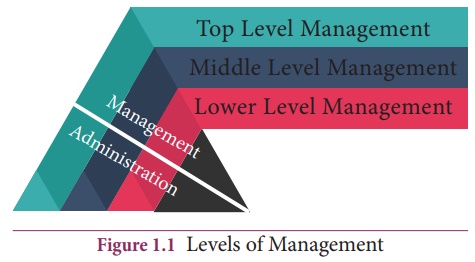Chapter: 12th Office Management and Secretaryship : Chapter 1 : Introduction to Management
Levels of Management
Levels of Management
The term
“Levels of Management” refers to a line of demarcation between various
managerial positions in an organisation. The number of levels in management is
based on the size of business. The levels of management can be classified in
three broad categories:

Top Level of Management : It consists of board of directors, chief executive
or managing director, president, vice president and all top level managers. Top
level management is responsible for controlling and overseeing the whole
organisation. They develop goals, company policies takes major decisions which
affects the whole organisation. They are answerable to shareholders and public.
Following are the role of top level management
1. Determination
of objectives
2. Formulation of
policies
3. Preparing long
range planning and strategy
4. Organising for
action
5. Keeping
communication between the organisation and outside world
6. Ensure
Co-ordination and effective control of activities.
Middle Level Management: Middle level management is also known as executory
level management. They are subordinate to top level management and responsible
for the direction of lower level management. It consists of branch managers and
departmental managers. The middle level managers are in charge for training of
lower level employees.
Their role can be emphasized as
1. They execute
the plans of top management
2. They make
plans for sub-units of the organisation
3. They interpret
and explain policies from top level management to lower level
4.
They motivate the lower level
management workers towards better performance
5. They have to
evaluate the performance of the employees
6. They have to
coordinate the activities of the organisation
Lower level of management: Lower level is also known as Supervisory/
Operative level of management. It consist of supervisors, foreman, section
officers, superintendent etc. They focus on controlling and direction.
Their activities include
1. Assigning job
to various workers.
2. They instruct
workers for day to day activities.
3. They
communicate workers problems, suggestions etc to top level management.
4. They help to
solve the grievances.
5. They motivate
workers to attain goal.
6. They ensure
discipline in the enterprise.
7.
They give periodic report about
workers to their superiors.
Related Topics